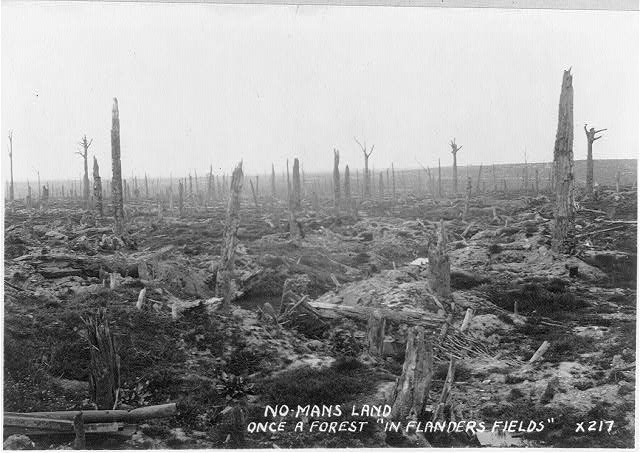Audio
Track:
About
The song was published in 1917 as the first in Three Songs of the War.

Photo: No Man’s Land – once a a forest in “Flander’s Fields”. c1919. Prints and Photographs Reading Room, Library of Congress.
While the socially conscious Ives had been steadfastly against the war, he became a supporter of American participation nearly overnight, following President Woodrow Wilson’s insistence that “the world must be made safe for democracy,” and his call for the establishment of a world “league of peace.” Ives donated funds and even volunteered to drive an ambulance on French battlefields for six months (a duty for which he was apparently not accepted).
Despite Ives’s support of the war, the song depicts the conflicting emotions of patriotism and horror associated with armed struggle. The unrelieved sequence of dissonant intervals of the seventh, as well as the octaves played in the low range of the piano with which the work begins, establish at once the work’s ominous tone. While heroic elements are introduced which resemble the patterns and simple harmonies of hymn tunes–fragmentary references to “America,” “La Marseillaise,” and “The Battle Cry of Freedom” may also be heard–the persistent dark, percussive chords in the bass which permeate so much of the work are all that remain at its conclusion, reiterated more and more softly, like the solitary beat of a drum (or perhaps the strumming of a celestial harp?), steadily moving farther off into the distance, underscoring the tragic loss of so many lives as the price paid in war.
The premiere performance of “In Flanders Fields” was as non-traditional as the music itself, taking place during a luncheon held at New York’s Waldorf-Astoria Hotel on April 15, 1917 for insurance company managers (one of whom was, of course, Ives himself). At the suggestion of Ives’s business partner Julian “Mike” Myrick, Ives had composed the song based on the well-known poem “In Flanders Fields.” The poem was written by John McCrae, a Canadian army doctor and medical examiner at Mutual Insurance. McCrae wrote it in 1915, the day after he watched a friend die in the Second Battle of Ypres (Belgium). He himself would die of pneumonia while on active duty in France in 1918. The poem was published in Punch magazine in December 1915. It was Myrick who suggested a performance of the song at the managers’ luncheon. The idea of a collaborative creative effort between two insurance men apparently appealed to Ives, as did the fact that the occasion would represent a rare instance of a public performance of his work, so he consented to Myrick’s plan. While the song is one of Ives’s more approachable works, and despite its patriotic rhetoric (it was composed and performed, after all, only days after America entered the war), the song was nevertheless “challenging for ears of the time,” writes Ives biographer Jan Swafford. The complexity of the song was also not supported by its apparently substandard performance on this occasion, which proved to be a great disappointment to the composer. “[D]espite [Ives’s] coaching neither singer nor pianist was up to [the performance]. Likely an embarrassed time was had by all.”
–Library of Congress
Text
In Flanders Fields
by Lieutenant Colonel John McCrae, M.D.
In Flanders fields the poppies blow;
Between the crosses, row on row
That mark our place; and in the sky
The larks still bravely singing fly,
Scarce heard amidst the guns below.
We are the dead. Short days ago
We lived, felt dawn, saw sunset glow,
Loved and were loved, and now we lie
In Flanders fields.
Take up our quarrel with the foe:
To you from falling hands we throw,
The torch; be yours to hold it high
If ye break faith with us who die
We shall not sleep, though [the] poppies grow
In Flanders fields.

